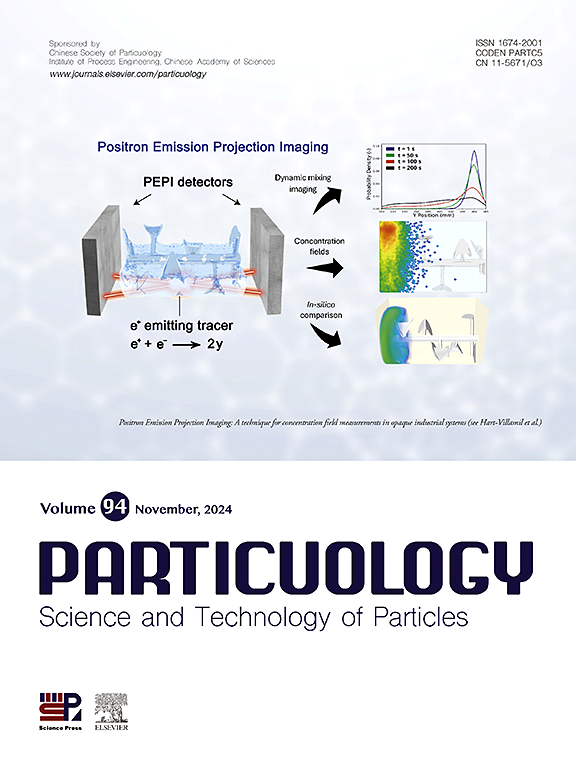Targeted and pH-sensitive polyzwitterionic liposomes for oral anticancer drug delivery
IF 4.1
2区 材料科学
Q2 ENGINEERING, CHEMICAL
引用次数: 0
Abstract
Compared to intravenous injection, oral administration is attractive due to its many advantages for cancer therapy. Taken physiological barriers and other profiles of oral anticancer drug carriers into consideration, targeted and pH-sensitive polyzwitterionic liposomes (ZL) based on zwitterionic poly(carboxybetaine) (PCB) were constructed for oral delivery of doxorubicin hydrochloride (DOX·HCl) for cancer therapy. The DOX-ZL with 40% trehalose had good lyophilization stability, which would be packaged into enteric capsules to enhance their stability in stomach. In addition, DOX-ZL exhibited good storage stability and serum stability. The DOX-ZL could achieve controlled release of DOX·HCl at the endosomal pH 5.0 due to the pH-sensitive of zwitterionic PCB. Importantly, DOX-ZL could targeted deliver DOX·HCl to Caco-2 cells to cross the intestinal epithelial cell layer. The empty ZL had good biocompatibility, while DOX-ZL significantly inhibited tumor cells growth due to their high cellular uptake and controlled drug release ability. Therefore, this work provided a promising approach for oral cancer therapy.

用于口服抗癌药物的靶向性和ph敏感性多两性离子脂质体
与静脉注射相比,口服给药在癌症治疗中具有许多优点。考虑到口服抗癌药物载体的生理屏障和其他特性,构建了基于两性离子聚羧基甜菜碱(PCB)的靶向ph敏感多两性离子脂质体(ZL),用于口服给药盐酸阿霉素(DOX·HCl)治疗癌症。添加40%海藻糖的DOX-ZL具有良好的冻干稳定性,可将其包装成肠溶胶囊,以提高其在胃中的稳定性。DOX-ZL具有良好的贮藏稳定性和血清稳定性。DOX- zl对两性离子PCB具有pH敏感性,可在pH 5.0的内体条件下实现DOX·HCl的控释。重要的是,DOX- zl能够将DOX·HCl靶向递送至Caco-2细胞,穿越肠上皮细胞层。空的ZL具有良好的生物相容性,而DOX-ZL由于具有较高的细胞摄取和控制药物释放的能力,可以显著抑制肿瘤细胞的生长。因此,这项工作为口腔癌的治疗提供了一条有希望的途径。
本文章由计算机程序翻译,如有差异,请以英文原文为准。
求助全文
约1分钟内获得全文
求助全文
来源期刊

Particuology
工程技术-材料科学:综合
CiteScore
6.70
自引率
2.90%
发文量
1730
审稿时长
32 days
期刊介绍:
The word ‘particuology’ was coined to parallel the discipline for the science and technology of particles.
Particuology is an interdisciplinary journal that publishes frontier research articles and critical reviews on the discovery, formulation and engineering of particulate materials, processes and systems. It especially welcomes contributions utilising advanced theoretical, modelling and measurement methods to enable the discovery and creation of new particulate materials, and the manufacturing of functional particulate-based products, such as sensors.
Papers are handled by Thematic Editors who oversee contributions from specific subject fields. These fields are classified into: Particle Synthesis and Modification; Particle Characterization and Measurement; Granular Systems and Bulk Solids Technology; Fluidization and Particle-Fluid Systems; Aerosols; and Applications of Particle Technology.
Key topics concerning the creation and processing of particulates include:
-Modelling and simulation of particle formation, collective behaviour of particles and systems for particle production over a broad spectrum of length scales
-Mining of experimental data for particle synthesis and surface properties to facilitate the creation of new materials and processes
-Particle design and preparation including controlled response and sensing functionalities in formation, delivery systems and biological systems, etc.
-Experimental and computational methods for visualization and analysis of particulate system.
These topics are broadly relevant to the production of materials, pharmaceuticals and food, and to the conversion of energy resources to fuels and protection of the environment.
文献相关原料
公司名称
产品信息
索莱宝
(5-Dimethylthiazol-2-yl)-2,5-diphenyltetrazolium bromide (MTT)
索莱宝
(5-Dimethylthiazol-2-yl)-2,5-diphenyltetrazolium bromide (MTT)
索莱宝
(5-Dimethylthiazol-2-yl)-2,5-diphenyltetrazolium bromide (MTT)
阿拉丁
DOX·HCl
阿拉丁
(NH4)2SO4
阿拉丁
DOX·HCl
阿拉丁
(NH4)2SO4
阿拉丁
DOX·HCl
阿拉丁
(NH4)2SO4
阿拉丁
doxorubicin hydrochloride
阿拉丁
(NH4)2SO4
 求助内容:
求助内容: 应助结果提醒方式:
应助结果提醒方式:


